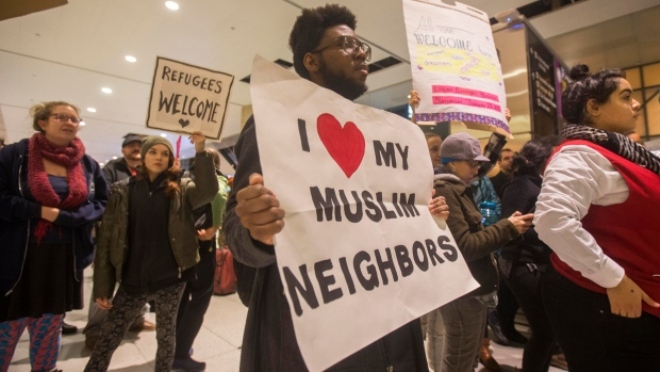Scotusblog
Tuesday September 12, 2017

In late June, the Supreme Court agreed to review decisions by two lower courts blocking the Trump administration from implementing the president’s March 6 executive order.
That order, often known as the “travel ban,” put a freeze on new visas for travelers from six Muslim-majority countries – Syria, Sudan, Somalia, Libya, Iran and Yemen – and suspended travel by refugees into the United States.
The justices allowed the Trump administration to put part of the ban into effect while the government’s appeals are pending, but that did not settle the matter entirely. Instead, the two sides in the dispute have continued to litigate exactly how broadly the ban applies.
That litigation returned to the Supreme Court again today, as the Trump administration asked the justices to put a later lower-court ruling – on which refugees qualify for an exemption from the ban – on hold. Justice Anthony Kennedy, who handles emergency appeals from the U.S.
Court of Appeals for the 9th Circuit, acted quickly on the government’s request: This afternoon he stayed the lower court’s ruling and ordered the challengers to respond by noon tomorrow.
In the brief, unsigned order that it issued in late June, the Supreme Court left in place the lower-court orders that barred the government from enforcing the ban with regard to the named plaintiffs in the case and other foreign nationals who have a “credible claim of a bona fide relationship with a person or entity in the United States.” But the challengers and the government have not been able to agree on exactly what that phrase means. In the government’s view, some relatives – such as parents, spouses and children – would be exempt from the ban, but others – such as grandparents and grandchildren – would not.
The government also indicated that an agreement between a refugee resettlement agency and the Department of State for the agency to help a specific refugee after his arrival in the United States was not, standing alone, the kind of “bona fide relationship” that would exempt the refugee from the ban.
The challengers disagreed and went back to court. After a lengthy series of proceedings, last week the 9th Circuit upheld a district court ruling that would require the government to allow refugees covered by resettlement agreements to enter the United States.
With that ruling scheduled to go into effect tomorrow, the Trump administration once again asked the justices to step in. (The administration did not, however, ask the justices to block the portion of the lower court’s decision that defined a “close family relationship” more expansively than the government had, to include (among others) grandparents.)
In today’s filing, the Trump administration complains that the lower court’s order is “deeply flawed” and “would as a practical matter render” the Supreme Court’s late June order on refugees “a dead letter.”
The government explains that a refugee-resettlement agreement is an agreement between an agency and the federal government; it does not create any other connection between a refugee and the agency. Because virtually all refugees are the subject of such an agreement, the government contends,
“it is not plausible that” the Supreme Court would have issued an order that partly allowed the ban to go into effect but not intend it to apply to any refugees.
Oral argument on the broader challenges to the travel ban is scheduled for October 10.